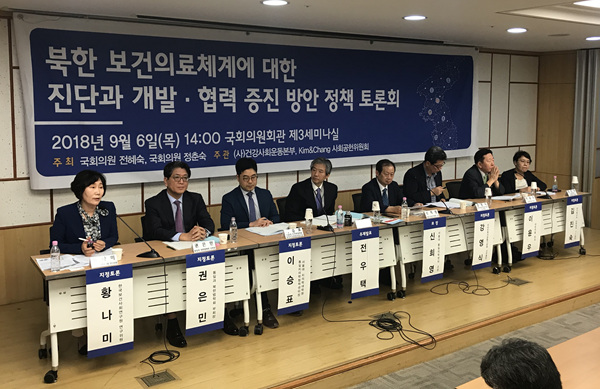A South Korean medical expert claimed that two Koreas should cooperate to form a joint health community on the Korean Peninsula amid improved inter-Korean relations.
However, other experts pointed out that such scenario may not be feasible due to continued sanctions against North Korea and too much cost.
There were also views that the South should focus on resolving its healthcare issues first, rather than getting ready for a unified health community.
On Friday afternoon at the National Assembly, Reps. Jeon Hye-sook and Cheong Choun-sook of the ruling Democratic Party of Korea held a debate forum on how to diagnose, develop, and cooperate for the North’s healthcare system.
Jeon Woo-taek, chairman of the Association of Healthcare for Korean Unification (AHKU), proposed to establish an inter-Korean health community.
According to Jeon, it would be impossible to swiftly build a joint healthcare system after the reunification of the two Koreas, because of a wide gap between South Korea’s economic power and that of the North.

Before a reunification, the two Koreas need a health community, which should be established based on the United Nations’ Sustainable Development Goals (SDGs), he said.
As the U.N. aims to address poverty and public health issues of the underdeveloped countries through SDGs, the goals will apply to North Korea, too, Jeon said.
“There are lots of things to do for South Korean healthcare professionals to form a health community on the Korean Peninsula. First, we should not only strive to grow our expertise but deepen our insights into humans, society, and history,” Jeon said.
He went on to say that as South Korean physicians have accumulated clinical experience with more than 32,000 North Korean defectors, they should broaden understanding about North Korean patients.
In response to his proposal, researchers and industry executives said Jeon’s idea would need thorough reviews in various sectors.
Hwang Na-mi, a research fellow at the Korea Institute for Health and Social Affairs, said the South should deal with its healthcare issues first, before discussing to form a joint health community.
“Within South Korea, we have made several medical reforms and policy revisions but failed to address many problems such as enhancing primary care and the issue of giving medical licenses both to physicians and Korean Oriental medicine practitioners,” Hwang said.
She picked several issues as top priorities: establishing a medical safety net, improving healthcare accessibility, sustainable financing for the cost to enhance health insurance coverage, and boosting primary care and preventive services.
Hwang noted that targeting North Korean people as beneficiaries of long-term support in inter-Korean cooperation for healthcare could destabilize the South’s financial base.
“Due to the health disparities between the two Koreas and different economic levels of the low-income people between the two, it will be impossible to earn a social consensus on the South’s spending for setting up a joint health community,” she said.
Kwon Eun-min, vice president of Unification and North Korean Law Studies, said the ongoing sanctions against North Korea makes it challenging to push for various projects.
“If the South plans to go ahead with healthcare exchanges, the government should review not only the South’s healthcare laws but those of the North,” he said.
Kim Jin-sook, head of the Ministry of Health and Welfare’s task force for inter-Korean cooperation, said the North should understand and implement the protocol of official development assistance (ODA), used in the international community.
“It is not easy for the South to run an inter-Korean project due to North Korea sanctions. North Korea’s leader Kim Jong-un is demanding the international community treat the North as a normal state,” Kim said. “If the North wants to be treated as a normal country, it should understand the international ODA protocol.”
However, Kim remained optimistic about the South’s cooperation with the North in the healthcare sector.
“While doing ODA projects overseas, we think about giving aid to the North a lot. As the North uses the same language and it is located near the South, many elements could go smoothly,” she added.
(Caption)
Physicians, healthcare industry executives and government officials discuss how to diagnose, develop, and increase cooperation with North Korea’s healthcare system, at the National Assembly’s seminar room, Thursday.

